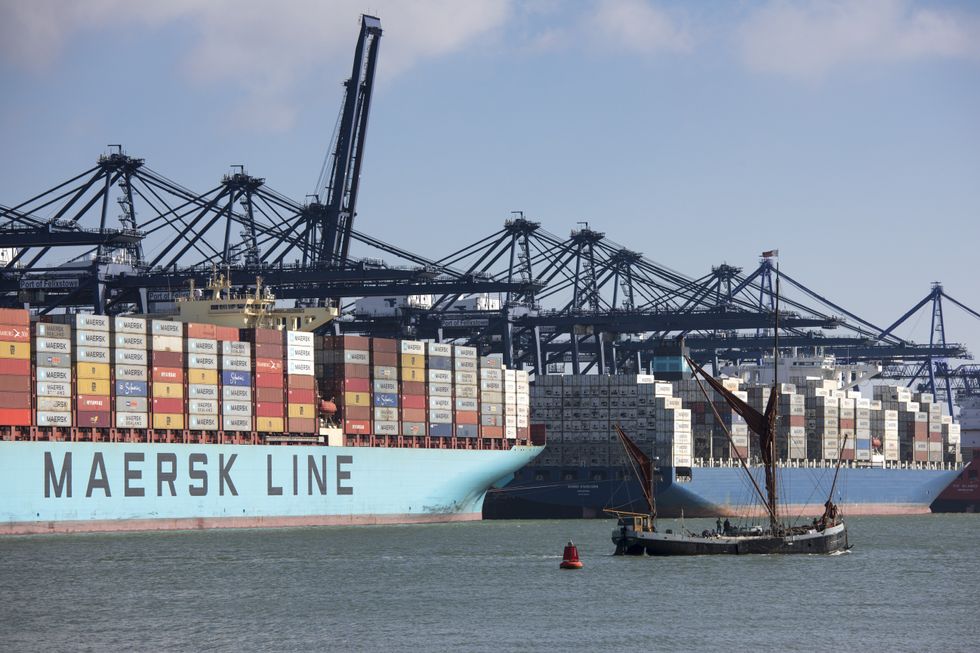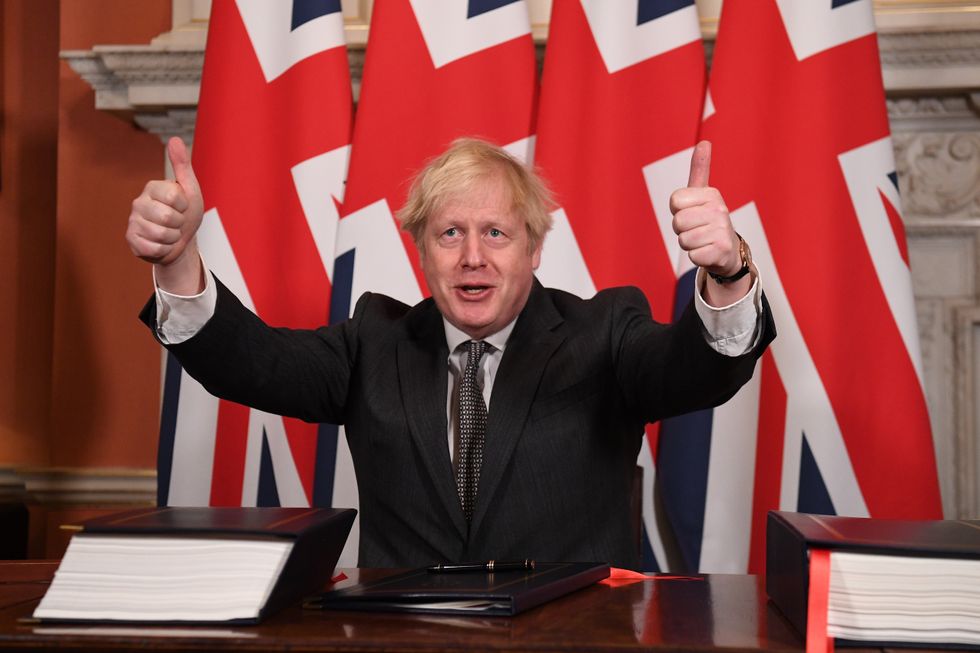A new report rejects the claims of a post-Brexit trade decline
Tory MPs told GB News that the IEA’s report showed the UK will have a bright future outside the EU’s single market and customs union
Don't Miss
Most Read
Trending on GB News
Critics of Brexit were wrong to predict a trade disaster outside the European Union, a report has suggested.
The Institute of Economic Affairs' (IEA) latest report revealed the United Kingdom’s decision to leave the Brussels bloc has not damaged cross-Channel trade flows.
It showed trade continued to grow from the day of the 2016 referendum to the end of the transition period.
UK goods exports also grew by 13.5 per cent to EU countries and 14.3 per cent to non-EU countries between 2019 and 2022.
WATCH NOW: Nick Thomas-Symonds on Brexit trade deal
British services exports soared by 14.8 per cent to EU countries and 22.1 per cent to non-EU countries over the same period.
Economist Catherine McBride, who penned the report, argued Covid-19, rising global energy prices and new “rules of origin” have influenced particular trading patterns.
McBride also insisted pessimistic predictions downplayed the UK’s tariff-free deal with the EU and overlooked the potential benefits of having an independent trade policy.
She wrote: “While the data is still emerging and longer-term effects are as-yet unknowable, in general, there has been no real disparity between UK trade with EU and non-EU countries.
“Nor has there been a sharp fall in UK–EU trade either at the aggregate or sector level despite it now being seven years since the vote to leave the EU and three years since the UK actually left.”
McBride added: “A false narrative that Brexit has harmed UK trade is now firmly entrenched in the British public psyche, but this just isn’t true. The trade data doesn’t show this. Just as false is the idea that trade friction has reduced UK-EU trade.”
The report’s release comes as Business Secretary Kemi Badenoch prepares to address the International Trade Week’s launch event in London.
She is expected to say: “This is why I just don’t agree with the narrative that Brexit has 'severely damaged' our economy. Every major country, especially in Europe, has faced significant economic challenges over the last few years.
LATEST DEVELOPMENTS:
Kemi Badenoch, the Business and Trade Secretary, said "global Britain is here and it’s thriving”
PAThe Saffron Walden MP, who threw her weight behind the Vote Leave campaign, will likely add: “As the ONS will also confirm, our goods exports are back to pre-Brexit and pre-Covid levels. And we remain the second largest service exporter in the G7.
“Britain is growing faster than Germany and France. Our tech sector is thriving, with more unicorns than France and Germany combined. And our manufacturing sector has overtaken France to become the eighth biggest in the world. This is what I want to talk about.”
A number of Eurosceptics welcomed the IEA’s report, telling GB News that Britain was now the continent’s “powerhouse”.
Lichfield MP Michael Fabricant said: “An independent global Britain rather than one tied to European coat tails was always going to be a winner. We have done much to make Britain a more competitive place to invest, but still more needs to be done. We are the powerhouse of Europe!”
Former Brexit Minister David Jones, who now serves as deputy chairman of the European Research Group, added: “This report gives the lie to the downbeat predictions of Remainers ever since the UK voted to leave the EU in 2016.
“Rather than talking our country down, they would do better to recognise that, outside the EU, the UK is well placed to benefit from the technological advances we see emerging. The UK is once again a world-trading nation. Unshackled from heavy – handed EU regulation, it stands to achieve much more.”

Foreign container ships docked at Port of Felixstowe
GETTY
However, pro-EU groups have voiced concern about the report and Badenoch's comments.
European Movement UK chair Dr Mike Galsworthy told GB News: "This report is from a pro-Brexit economist from a pro-Brexit think tank - and we all know what think tanks are for. If you really want to know the Brexit impact on trade, just talk to the representatives of sectors dependent on trade, from small businesses to farming and fishing. They all tell the same story or restricted access, added paperwork, new bureaucracy mazes and closing down of options.
"Looking at a top-line in trade tells you nothing of the change in trading experience of so many small players. Rather, it just makes you wonder how healthy UK trade and the public purse could and should be right now if we had not drowned so many struggling British businesses under a truckload of Brexit red tape."
Criticising Badenoch over her comments, Best for Britain chief executive Naomi Smith added: “Where once she promised Brexit benefits, the Trade Secretary is now shamefully celebrating an overall fall in UK exports, as a fig leaf for the damaging impact of the Government's botched Brexit deal.
“While this downturn was not exclusively caused by Brexit, countless export businesses have described the crippling impact of new red tape, delays and labour shortages from our withdrawal from the EU, something that the next government must remedy by removing trade barriers and aligning with our largest market where beneficial."
Some Eurosceptics were also keen to stress the Government needs to do more to deliver additional benefits as recent opinion polls suggest the British public is turning towards a more pro-EU position.
“This important report shows that, yet again, the OBR continues to be inaccurate and overly pessimistic towards the UK economy,” an ERG source told GB News.
“The Chancellor should stop taking its forecasts as gospel and provide measures that will help continue to foster growth brought about by our new, exciting Brexit freedoms.”
Former Tory MEP David Campbell-Bannerman, who served as deputy chairman of UKIP, added: “We led G7 in 2021 and 2022 - and we are only just starting to seize the benefits of Brexit. The main economic benefit is to cut billions of wasteful over regulation imposed by EU. We should even cut the EU’s Equality Directive which has caused so much confusion and should fire any civil servant that stands in its way.”

Pro Brexit supporters celebrates as the United Kingdom exits the EU during the Brexit Day Celebration Party hosted by Leave Means Leave at Parliament Square
GETTY
Reform UK leader and GB News presenter Richard Tice also said: “The establishment didn’t want Brexit, they were always against it, they want to stop it, damage it, overturn it and then indeed diss it by suggesting it’s going to cause harm to our economy.
“What is causing harm to our economy is high-taxation and high-regulation. Brexit gave the great opportunity to reduce taxes in certain areas at our decision not Brussels and it gave us the opportunity to slash whole swathes of daft EU regulations. Regrettably the Government has not chosen to do either of those things. It has increased taxes, it has increased regulations and the direct effect of that is that we’ve got zero growth in the economy.”
A number of leading organisations were slammed by Levelling Up Secretary Michael Gove for issuing dire predictions about the UK’s post-Brexit economy during the referendum campaign.
The predictions, dubbed “Project Fear” by Eurosceptics, have continued to be decried since the UK severed ties with the EU.
The Office for Budget Responsibility (OBR) even warned Brexit-induced barriers would result in a 15 per cent drop in trade volumes, contributing to a four per cent long-term hit to GDP.
However, Remainers will point to the UK’s inflation figure falling at a slower rate compared to Britain's former EU partners as an example of where Brexit is holding the economy back.
Ex-Bank of England Governor Mark Carney blamed Brexit for increasing prices and separate research by the Centre for European Reform (CER) claimed leaving the bloc has already cost the UK a staggering £33billion in lost trade and investment.
More than three-quarters of UK-based firms also warned Boris Johnson’s post-Brexit agreements with the EU were not helping them expand their entrepreneurial endeavours.

Foreign container ships docked at Port of Felixstowe
GETTY
The survey, conducted by the British Chambers of Commercs, found 56 per cent of respondent members who trade with the EU have experienced problems complying with new rules for exporting goods.
Issues could continue after the EU warned Brexit barriers will increase in the coming years if the UK opts to diverge from Brussels-derived rules.
Badenoch came under fire from Eurosceptics earlier this year after failing to push ahead with plans to repeal all EU legislation by the end of 2023.
The agricultural sector is particularly feeling the Brexit bite, with the Liberal Democrats continuously pitting themselves as pro-farmer in the wake of the UK’s newly signed trade deals with Australia and New Zealand.
Liberal Democrat Treasury spokesperson Sarah Olney told GB News: “British farmers and fishermen have been completely screwed over by botched trade deals. Politicians need to get out of the Westminster bubble and hear from businesses and rural communities, to see the effects for themselves.”
However, Eurosceptics insist striking new trade agreements, including ongoing talks with India and the recent accession into the CPTPP, should be seen as major benefits which should be seized upon.
Leavers also point to Germany’s economic woes as a key example of how the situation might not have been any better inside the bloc as Berlin entered a recession earlier this year.
The tirade against the establishment continued in the summer when the International Monetary Fund was forced to revise dire economic predictions which placed Britain at the bottom of the G7.
More recent estimates suggested the UK has outperformed France and Germany since the coronavirus pandemic rocked the world economy in March 2020, with the IMF adding that Berlin will continue to languish behind London for the remainder of 2023.








